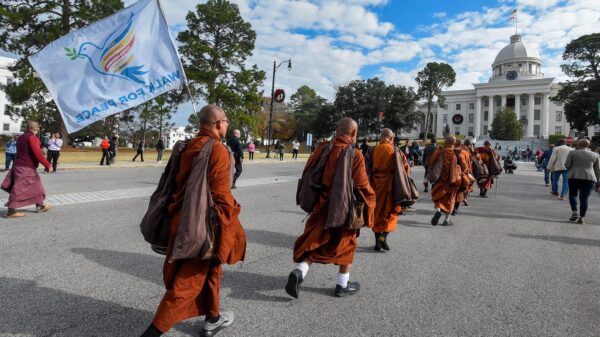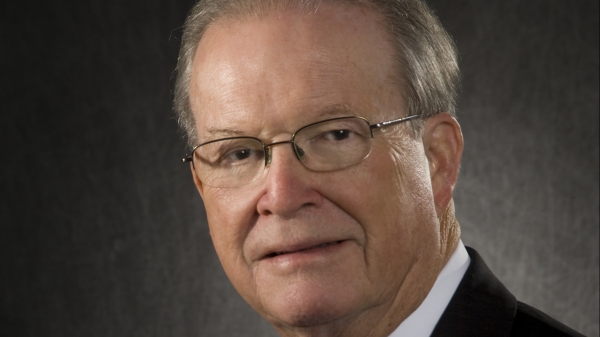By Sam McLure
Alabama Political Report
“The greedy misuse the world by striving to acquire it; the monastics, by struggling to renounce it.” Carter Lindberg
The overall goal of restraining greed in politics should be aimed at making the political process more responsive to the “common community of voters” and less responsive to “business-conglomerate greed interests.” The irony of decreasing the influence of the business-greed party is that it actually promotes the prosperity of the community as a whole. As discussed in Part 1 of our series, the mantles of Republican and Democrat mean nothing to the Greed Party which manipulates both for the enrichment of a select few business interests.
In our Introduction with Mr. Blue Suit, we explored a satirical analogy of greed in politics; and in Part 2, we explored poignant examples of greed at work in Alabama politics. This final installment of our series will focus on Jenga-Pin solutions to this most difficult political question: how to restrain the forces of greed in government.
As a boundary on the ideas presented, let me here say that I am not advocating for a complete eradication of the influence of the business community within politics. The business community provides jobs, and jobs provide wealth to the common community. What I am advocating for is a necessary shift in the paradigm of power.
Five Failing Solutions to Restraining Greed in Government
I reference these topics as “five failing solutions,” because that is exactly what they are … without heeding the words that Michael Jackson so famously evoked – calling our attention to the Man in the Mirror: “If you wanna make the world a better place / Take a look at yourself and then make the change.” From beginning to end, this is where the change must occur.
Without further ado, our five solutions for consideration are as follows:
(1) mobilize grassroots activists to run for office; (2) restrict the prowess of the political action committee; (3) create pathways for third-party competition; (4) Attorney General should prioritize investigation and prosecution of “business-interest” lobbyists; and (5) implement a Pence-style federal money task force.
(1) Mobilize Grassroots Activists to Run For Office
When you see the world as Adam Smith did in 1776 and John Calhoun in 1830, you see that there are two great forces in opposition within any government. It’s not Democrat v. Republican; the forces at odds are the greed-business interests and the interests of the common community.
Thus, there are two basic paths by which a political candidate finds themselves in the sphere of government influence. Political candidates are either thrust into service with responsiveness to the needs of the community or they are propelled into service by the covetousness of the business-greed party.
Alabama needs more concerned citizens engaged in politics. Most people who are not consumed with greed have no desire to engage in political struggles. On the whole, the mass of the common community is content to eat, drink, and rise up to play. Truly, the greatest enemy for freedom is not tyranny, but apathy.
Alabamians are notorious for their love of football. We have to give up some other love in order to love doing justice, mercy, and humility … and their application to making our state a freer community. It was the practice of ancient Rome to use the bloodbaths of the Coliseum to numb the citizenry to the awful tyranny of the ruling class. We will never see different in our time. We will never see the government infringing on Alabama’s “right” to participate in sport.
It is incumbent upon the older generation to instill a passion in the younger generation to run for office and engage in our State’s political struggles. Many offices in the State of Alabama can be pursued at the age of 18 and many more at the age of 21. For example, a young man or woman can serve on the Public Service Commission or State Board of Education at the age of 18; Mayor, City Counsel, Sheriff, and County Commission are also in play for the ambition 18 year old.
If we are troubled by the reality of greed’s stranglehold on Alabama’s mechanisms of government, we must mobilize to service those whose allegiance are tethered to the community, not greed.
(2) Restrict the Prowess of the Political Action Committee.
The purpose of a political action committee (PAC), in federal elections, is to circumvent the $2,700 individual giving limit. If you are a wealthy business owner of a coal company and want to donate $2,000,000 to a candidate that you think will protect the coal industry, you form a “super” PAC and put $2,000,000 in it. Then, you convince a couple other Coal CEOs to donate their money too. Before you know it, your Coal PAC has $10,000,000 to get the right candidates elected to Federal office.
State and local election (non-federal elections) are governed by state-law. Shockingly, Alabama is one of only six states which allow unlimited PAC and Corporate contributions to candidates. Most states put comparatively aggressive restrictions on PAC and Corporate contributions. For example, PACs in Kentucky are restricted by the same $1,000 limit as individuals; and total PAC contributions must be less than 50% of a candidates total contributions. Furthermore, Corporate contributions are completely banned in Kentucky.
The affect of Kentucky’s restrictions on PAC and Corporate contributions is to encourage political candidates to be more responsive to the people – to the common community of voters – as opposed to the greed-business interests. For a candidate in Kentucky to raise enough money to win an election, the candidate has to be in front of, and in relationship with, actual people and is thus more responsive to the voice of the people. For a candidate in Alabama to win, and to raise enough money to win, the candidate only has to be in touch with the right few power players.
One of the top three PAC contributors in Alabama is Progress PAC, controlled by the Business Council of Alabama (BCA). Mike Hubbard and Del Marsh both received over $100,000 from the BCA. In order to get the same contribution level in Kentucky, Hubbard and Marsh would have had to shake hands with 100 actual people who gave the maximum. In Alabama, Del Marsh only had to shake hands with Bill Canary.
Some politicos would argue that Americans spend more on Halloween candy than political campaigns, and thus the problem is really more linked to apathy. This is a good point, and I do not deny its veracity. After all, it was Winston Churchill who noted that “The malice of the wicked was reinforced by the weakness of the virtuous.”
On the other hand, even well intending “grassroots” advocates find the idea of limiting PAC donations unpalatable. Even noble-minded politicos know that a PAC concentrates the power of donation into their own hands, making their own agenda more potent. But, buyer beware – even these noble-PAC-ventures have the same consequence of distancing the average voter from the elected official. The noble-minded politico becomes the expert and representative of the people – with the same potential for unresponsiveness-to-the-commnity as BCA’s Progress PAC.
A note to the libertarian reader
Some libertarian-leaning politicos might cry “foul” here at the prospect of limiting the free market. I would draw the attention of such a reader to the arguments presented in Part 2, illustrated by the maxim, “Politics is no place for the invisible hand of capitalism.”
In the realm of stewarding environmental resources, history and experience show us that there are some assets which must be protected from the free market. There is no short-term financial incentive for Acme Corp to not dump its industrial waste into the Alabama River. And, the long term negative effect of such pollution to the health and wellbeing of the State is unquantifiable. Thus, we permit government to intrude on the free market and regulate the disposal of industrial waste.
However, this is a dangerous power being wielded by government. As soon as the hand of government has been extended to meet a legitimate need through regulation, business-greed interests will try to extend that same hand for the establishment of a monopoly on the market.
That disclaimer aside, the point is clear: if the free market must be protected from greed with the environment, how much more must the full force of greed-business interests be restrained in politics?
(3) Create Pathways for Third-Party Competition
The stranglehold of the business-conglomerate-interests on the two-party adversarial system is so strong it is doubtful that either party can extricate itself from the coils of the anaconda’s grip. Alabama’s path forward presents with the solution of opening up competition with the two party system. A third party must arise which competes with both parties by specifically attacking the slithering greed party and its hold on Republicans and Democrats alike.
Unsurprisingly, the two-party system has, in fact, protected itself from competition by implementing entry barterers to the political process against third parties. Lamentably, Alabama is one of the top-ten most restrictive states in the Union for third parties to compete in the political process.
In Alabama, candidates must acquire written petitions of Alabama citizens in an amount equal to 3% of the population of Alabama. That’s about 35,000 signatures. Through the process of determining if these signatures are valid, the Secretary of State discards many “invalid” signatures. Thus, conventional wisdom dictates that third party should acquire 50,000 signatures – just to be safe.
For experienced third party advocates, like former Chairman of the Libertarian Party of Alabama, Leigh Lachine, the prospects of gathering volunteers to acquire those signatures is just too daunting. Lachine recommends hiring a professional firm; the cost is about $3.00 per signature. Thus, for a third party to get on the ballot, they have to spend an initial $150,000.
According to FairVote.org, “No one has managed to complete this petition since it came into existence in 1997 except the Libertarians in 2000. Furthermore, if a party does get on, it needs to poll 20% of the vote for any statewide office to stay on.”
There is a rational basis in this, however. Printing ballots is expensive. This bar, at least, ensures that the particular third party represents a sufficiently numerical interest of the community to justify the expensive to the State of placing their candidate on the ballot.
While the ballot access numbers can and should be lower, what is completely unacceptable is the prohibition on third parties from raising money. Republican and Democratic candidates are able to raise money for the November 2018 election in June of 2017, one year before the primary. Third party candidates are prohibited from raising money until November 2017. Thus, not only are third party candidates handicapped with a $150,000 ballot access tab, they can’t get out of the gate with fundraising until 5 months after the two major parties. It’s hard to fathom any rational basis for this 1st Amendment infringement.
Further impeding the access of third-parties to compete against the greed-business party, is Alabama’s unwavering adherence to straight ticket voting. Alabama is one of only eight states which implements this restrictive voting process. Straight-ticket ballots contain the option for a voter to check a box that will allow them to vote for all candidates in either the Republican or Democratic parties – without having to check any boxes for individual candidates.
Thus, for the busy and uninformed voter, the option of checking one box instead of 14 is attractive. According to Josh Tuttle, current Chairman of the Libertarian Party of Alabama, an incredible 60% of voters choose to check the box indicating straight-ticket voting.
While this policy may save a few seconds for busy voters, the net effect is to encourage voters to ignore any option outside of the traditional two-party system … a net win for the greed-business community.
(4) Attorney General Should Prioritize Investigation and Prosecution of “Business-Interest” Lobbyists
Perhaps the most unpopular, but impactful, suggestion so far will be to prioritize prosecution of the tools of business-interest conglomerates; i.e., lobbyists. Certainly, we need stricter ethics restrictions … I would personally like to see persons whose livelihood is linked to lobbying for business interests barred from the State House during the legislative session. However, we must first ensure that the laws we do have are being rigorously enforced. Given all the ground we’ve covered; given the great propensity for the party of greed to manipulate government to their own good and the detriment of the community, we must demand that our Attorney General prioritize the investigation and prosecution of greed-party lobbyists.
We’ve seen the need for this with former speaker Mike Hubbard. He was prosecuted for criminal conduct, but what of the business-interest lobbyists paying him off? Why aren’t the payers of bribes, the lobbyists, being prosecuted?
We’ve seen this with Oliver Robinson, who struck a plead deal for corruption – for taking bribes from business-interest lobbyists … but, wait … where are the lobbyists? Are the bribers themselves being investigated and prosecuted?
Lobbyist are the tools in the hands of the greed interests. Lobbyists working for greed-business interests work in opposition to “grassroots” activists.
This legislative session saw the unprecedented volunteer work of a group of concerned citizens to pass Alabama’s mid-wife decriminalization bill. It was a show of force indeed with some unpaid supporter, usually pregnant with children in-tow, at the State House everyday of the session. One of the lobbyists of the greed-class in question could be heard saying under her breath, “What are THEY doing here?!”
We expect our tax-payer funded prosecutors to aggressively pursue criminals who rob houses to pay for crack cocaine. We should also expect our Attorney General to aggressively pursue politico-criminals who rob the poor to line their own pockets through manipulation of government policies and regulations. By prioritizing the investigation and prosecution of lobbyist misconduct, the Alabama’s Attorney General can reap untold rewards for the people of Alabama.
(5) Governor Should Implement Pence-style Federal Money Task Force
Just this week, the Alabama Department of Labor was bribed into collecting data on Alabama citizens with a $1,000,000 carrot from the Federal Government. Rep. Terri Collins, in collaboration with BCA, have been chasing this Orwellian Data Collection money for some time.
Does BCA stop to consider whether the money we are receiving is rightly obtained in the first place? Or, if the Federal Government is within the bounds of the Constitution to dispense it? No, the greed party doesn’t ask those questions. The greed party simply asks, “Is it possible, and do the rewards for me outweighs the risks for me?” Gov. Kay Ivey needs to establish a mechanism to oversee this race-to-the-bottom pursuit of federal money.
Alabama Attorney General’s Chief Counsel, Katherine Robertson, explained that when VP Mike Pence was Governor of Indiana, he “created the ‘Office of State-Based Initiatives’ in an effort to impose additional oversight and accountability on agencies receiving federal funds. The main goal of the office is to “contribute to Indiana’s continued fiscal health” by “working with agencies to push back against onerous regulations that often accompany the return of federal dollars to Indiana.”
Such a federal-money-oversight office in Alabama can be “charged with reviewing the state’s federal grant opportunities and giving approval for any agency to seek a federal grant.” Gov. Pence used this office to “subject each grant to a cost-benefit analysis” that “measure[s] the grant’s fiscal and regulatory impact.”
Alabama’s version of a Pence-style task force could go a long way to curtailing the forces of greed in Alabama politics. Access to the federal government’s deep pockets is often the main ambition of the greed-business interests in Alabama. Far too often, we see state actors competing to see how much of Alabama’s sovereignty they can cede to the federal government for a few ill-gotten morsels.
Conclusion
This is greed in politics: (1) powerful businesses use government to protect their turf and dampen competition, (2) elite businesses gain access to the public coffers through contracts, grants, and handouts, and (3) elected officials leverage their fiduciary position for self-enrichment or promotion. With greed driving the wheels of Alabama politics, all of this happens to the great detriment of the community.
Alabama can be free again. We can cast off the noose of slavery, slowly hung by the greed-business interests of our State. To do this, we must embrace our motto: We dare defend our rights.





















































